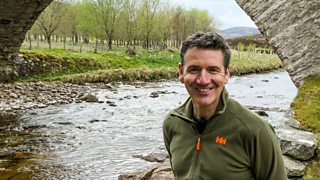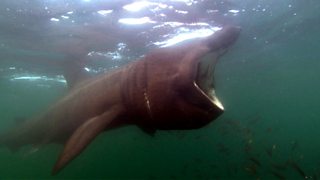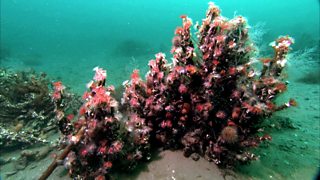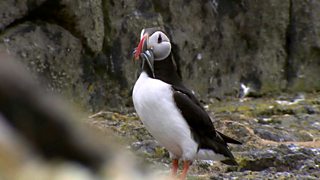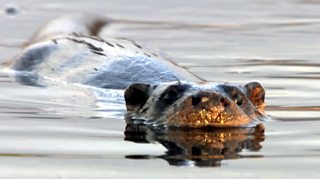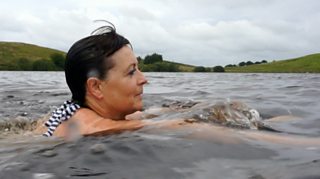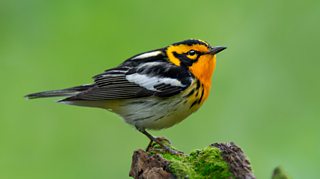Shark fin scoop: how tagging basking sharks with cameras is set to reveal their previously unseen behaviour
Very little is known about basking sharks but that’s about to change, thanks to a pioneering team of scientists and some underwater cameras.
The waters south of Tiree in the Inner Hebrides are hugely important for basking sharks, according to a team from the University of Exeter. They believe they're a key breeding ground for the second largest fish in the world — and they’re determined to prove it.

Tagging a basking shark
In a world first, a basking shark is tagged with cameras.
Speaking on Landward Dr Lucy Hawkes explained, “Basking sharks are big animals but they can also dive under the water and stay well out of sight for months and months of the year.
“I guess that’s how they’ve managed to keep this part of their life completely private from us.”
In a world first, Dr Hawkes’ team have attached front and rear facing cameras to sharks’ dorsal fins. However, as was demonstrated when Landward joined the expedition, it is not a straightforward operation.
“There are so many things you have to get right,” said Dr Hawkes. “The shark line up, the boat can’t go too fast, it can’t go too slow, the shark has to stay nice and shallow in the water.”
The team has also used an autonomous underwater vehicle (AUV) - known as SharkCam - alongside the tagged sharks to monitor their behaviour.

Basking sharks caught on camera in Inner Hebrides
Basking sharks caught on ‘SharkCam’ in Inner Hebrides
Dr Suz Henderson from Scottish Natural Heritage is keen to see the results of this study.
“The sexual lives of basking sharks — of any sharks — is really very little known about it, and it would just be absolutely fantastic if we could understand the full life cycle.”
Landward will share footage from the tagged sharks’ cameras later in the series.
On ����ý iPlayer
-
![]()
Landward
Dougie Vipond presents stories from the heart of the Scottish countryside.
Scotland’s coastal wildlife
Latest features from ����ý Scotland
-
![]()
'Wild swimming helps me process the grief of losing my son'
The benefits of cold water therapy.
-
![]()
Winter adventures are appealing, but an expert advises caution
Trips in winter require particular knowledge and skills.
-
![]()
The rescuers: Why volunteers risk their lives in mountain emergencies
Landward meets members of the Cairngorm Mountain Rescue Team.
-
![]()
‘Look for the light’ – practical tips to help you through another winter with SAD
Useful advice and tips to combat low moods at this time of year.
-
![]()
How you could be a binge drinker without even knowing
Binge drinking is classed as fewer units than many people may realise.
-
![]()
How chocolate biscuits and drama classes helped one man leave prison behind
The healing power of creativity.
-
![]()
'When people believe in you, it’s life-changing'
Author Graeme Armstrong revisits the man who helped turn his life around.
-
![]()
The 'breath-taking' display of US birds swept on to British soil
Recent storms have brought rare birds to our shores.
-
![]()
Six things we learned about Alan Cumming on Take the Floor (Spoiler: includes accordions)
The actor spoke to Take the Floor's Gary Innes.
-
![]()
How street gangs trap young men in a dangerous cycle of violence
The almost inescapable pull of life in a gang.
-
![]()
Why stylist Gok Wan believes there's no such thing as bad fashion
The fashion expert says we should stop following rules and do what feels right.
-
![]()
Is sending a CV still the right way to apply for a job?
They've been central to job applications for years, but are they worth it?
